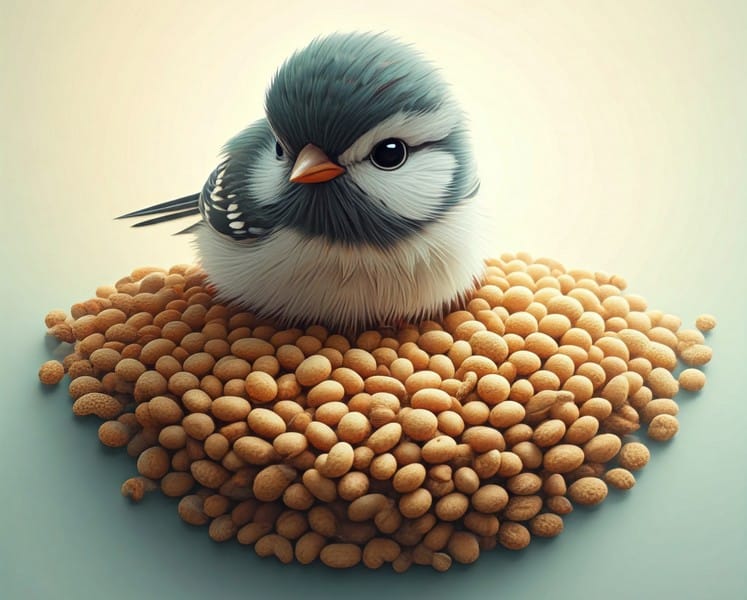Proper nutrition is the foundation of a healthy and happy life for exotic birds. Each species has unique dietary needs, but all require a balanced mix of essential nutrients to thrive. Feeding your feathered friend the right way can significantly impact their longevity, energy levels, and overall well-being.
This guide will help you understand the fundamentals of exotic bird nutrition, common feeding mistakes, and tips to keep your bird healthy.
1. The Basics of Exotic Bird Nutrition
Exotic birds, from parrots to finches, require a diet that mimics their natural eating habits. Here are the essential components:
- Fresh Fruits and Vegetables:
These should make up a significant portion of your bird’s diet. Examples include:- Fruits: Apples (seedless), papaya, mango, berries, and bananas.
- Vegetables: Kale, spinach, carrots, bell peppers, and sweet potatoes.
- Tip: Always wash produce thoroughly and cut it into manageable pieces.
- High-Quality Pellets:
Formulated pellets are a convenient way to provide balanced nutrition. Choose brands designed for your bird’s species, as nutritional needs can vary. - Seeds and Nuts:
While many birds enjoy seeds and nuts, they should be offered in moderation to prevent obesity. Use them as treats or supplements, not staples. - Grains and Legumes:
Whole grains like quinoa, brown rice, and cooked legumes like lentils provide energy and essential nutrients. - Proteins:
Protein sources, such as cooked eggs or insects, are essential for some species, especially during breeding or molting periods.
2. Foods to Avoid
Some foods can be toxic or harmful to exotic birds. Always keep these off the menu:
- Avocado
- Chocolate
- Caffeine
- Alcohol
- Onions and garlic
- Salty or sugary snacks
- Apple seeds (and other fruit pits)
3. Hydration Is Key
Clean, fresh water should always be available for your bird. Birds can be sensitive to water quality, so use filtered or distilled water if your tap water contains high levels of chlorine or heavy metals.
4. Species-Specific Dietary Needs
Different exotic birds have distinct nutritional requirements:
- Parrots (e.g., Macaws, Cockatoos): Thrive on a mix of fruits, vegetables, pellets, and occasional seeds.
- Finches and Canaries: Prefer small seeds like millet, supplemented with leafy greens and egg food.
- Lorikeets: Require specialized nectar diets and enjoy soft fruits like melons and berries.
- Eclectus Parrots: Need a high-fiber diet rich in fresh produce and limited pellets due to their long digestive tracts.
For more about specific bird diets, explore Top 5 Exotic Birds for Beginners.
5. Common Nutrition for Exotic Birds Mistakes
Avoid these pitfalls to ensure your bird’s health:
- Overfeeding seeds and nuts: This can lead to obesity and nutrient deficiencies.
- Ignoring dietary variety: A lack of variety can result in boredom and malnutrition.
- Offering unhealthy treats: Many human snacks are unsuitable for birds.
- Improper portion sizes: Overfeeding can lead to waste and health issues.
6. Tips for Encouraging Healthy Eating
- Introduce new foods gradually: Exotic birds can be cautious about unfamiliar items. Be patient and persistent.
- Use foraging toys: Hide food in toys to stimulate natural foraging behaviors.
- Observe their preferences: Monitor what your bird enjoys and adjust their diet accordingly.
- Regularly clean feeding dishes: Prevent bacterial growth by washing food and water bowls daily.
7. Signs of a Healthy Diet
A well-fed exotic bird will exhibit the following:
- Bright, shiny feathers.
- High energy levels and activity.
- Healthy droppings (consistent in texture and color).
- A healthy weight appropriate for their species.
If you notice changes in your bird’s appearance or behavior, consult an avian vet for dietary advice.
Final Thoughts
Providing proper nutrition for your exotic bird is an ongoing commitment, but the rewards are immense. A balanced diet keeps your bird healthy and vibrant and strengthens your bond as you share mealtime rituals.
Looking for more tips on exotic bird care? Visit our Birds Category for a wealth of resources to support your feathered friend’s well-being!


1 thought on “Diet and Nutrition for Exotic Birds”
Comments are closed.